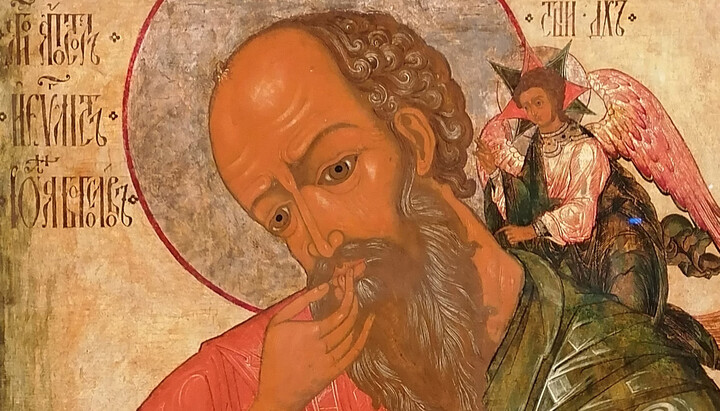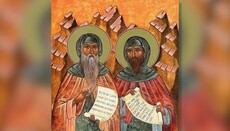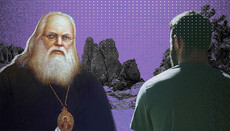The theology of Love and the theology of the dead letter

In memory of the Apostle and Evangelist John the Theologian.
The first true theologian in the Orthodox Church is considered to be the Apostle John. A simple fisherman who had never studied either sacred or secular wisdom. If the title of “theologian” were awarded by modern academic scholars, they would undoubtedly grant it to the Apostle Paul. There would be every reason to do so – his erudition, education, knowledge, skills, and abilities. But Church history took another path. Perhaps because the road to the knowledge of God lies through love, not bookish wisdom.
Bookish wisdom gives birth not to theology, but to religion, which often leads a person not to love but to self-exaltation, not to humility but to pride. Theology walks the path of sorrow, bearing the wounds of Christ. It contains nothing but love. In malice and hatred, falsehood reveals itself; in love, truth is recognized. Book knowledge does not answer questions about God – it merely multiplies them. A person proud of their knowledge will teach some, find fault with others, and rebuke the rest. Theologians, however, use all that happens to deepen their understanding of the immortal soul.
Everything in this world becomes “yesterday.” Only you and God remain “now.”
All things are in God's hands, not ours. A theologian is one who entrusts their entire life and hope to the hands of God. To become a theologian, a person must overcome their suffering with the love of Christ. They do not reject God's will, even when it contradicts their own. A theologian walks toward God for as long as they have the strength to go. And when their strength fails, God Himself leads them into His Kingdom.
A monk once told his disciples about an elder who was revered as a theologian. This elder always repeated: “I know everything that is in my Bible.” And everyone would bow their heads reverently, whispering to one another that such scholars of the Holy Scripture were rare indeed. The old monk’s esteem and honor grew day by day. One day, a young monk, hearing those words again, dared to ask, “Well then, Father, tell us all – what is in your Bible?” The elder leaned back in his chair and solemnly said, “In my Bible is a photograph of my departed elder and several letters from him written when I was still a young monk, every word of which I know by heart.”
A scribe knows everything in his Bible – his thoughts, his arguments, his reasoning and conclusions. He argues with those who disagree, resents those who criticize him. He believes in his Bible and fights for this belief against others.
Theologians do not argue or take offense. They know for certain that God has measured and ordained all things. Therefore, they leave behind every worry for the fate of the world and concern themselves only with their own salvation. And in this, they help the world more than all the rulers, politicians, rich men, and scholars combined. A ruler believes in the significance of his reign. A politician believes in the significance of his actions. A rich man believes in the significance of his wealth. A scholar-scribe believes in the significance of his discoveries. Yet without grace, all of it is but a vain myth and an earthly dream. Only the acquisition of grace brings peace and wisdom not of this world – wisdom without hatred, without enmity, without ill will toward any person or thing in this fleeting, transient world where nothing lasts beyond a moment.
A theologian, for the sake of joy, does not invent a life for himself or for others. God takes care of all these things.
In all his actions, a theologian is first and foremost a Christian. He strives to abide in the attention of the spiritual heart, directly perceiving that he is an immortal and good spirit, created in the image and likeness of God. When a Christian allows the existence of anything apart from God, he ceases to be a theologian. Bookish piety is always hasty; spiritual life is patient. A scribe who believes only in his own mind cultivates a demon within himself. One who believes only in this world creates hell. The mind breeds false images of God, the world, and humanity – and presents them as lofty theology.
Do you want to know whether you are a theologian? Then ask yourself: “Have I been freed from fear?” The one in whom grace dwells knows no fear. The scribe lives by the mind, which binds his freedom and frightens him with its illusions.
Theologians do not care whether they perish from wounds in war or die a natural death. For them, only one thing matters – to discover the immortality of their spirit and to be free of all earthly circumstances, inheriting eternal life in Christ. Eternal life can only be found – and become your life – through renunciation of temporal life. A theologian discovers the truth that makes him free, and in that freedom all earthly things come to an end.
Reading books is intellectual knowledge. It is talk. The acquisition of grace is spiritual knowledge. It is unceasing practice. A theologian knows how to distinguish between the two. What he sees around him, he calls his fate. What he sees within himself, he calls his salvation. The credo of theology is simple. Want to behold the unearthly light within? – Arm yourself with patience. Want to feel Divine love within you? – Arm yourself with humility. To be with people while not separating from God – this is the essence of theological practice.
The one who thinks of themselves as a body fears incurable disease. The one who thinks of themselves as a mind fears obsessive thoughts. The one who, by grace, has come to know their spirit – fears nothing. It is better to be alone with God than alone with the best of books.
Earthly history has known many good and sincere scholars, philosophers, and scriptural theologians. But all of them came from darkness and returned to darkness – if they did not come to know Christ.
To love or hate someone in particular – this is egoism. To love all without attachment, bearing no hatred, forgiving everyone, and desiring salvation for all – this is theology. Life is beautiful only when it is eternal life. All else is merely pain and disappointment. To serve God without love is impossible; any standing before His throne without it is a vain labor with unpredictable consequences.
Spiritual, grace-filled joy is the surest sign of true theology and of ascending toward knowledge of God. This quiet, radiant joy is born from proper, humble, and repentant prayer – which leads to the stilling of the mind.
A theologian is, above all, a practitioner of prayer. The Jesus Prayer is not a spell, like a crow’s cawing, nor a meaningless monotone, like a parrot’s chatter. It is gained through repentant, prayerful struggle. From prayer comes the experience of grace. Grace is acquired through complete humility. Humility is born of the total self-offering to God.
Thus, a Christian becomes a theologian.
The Jesus Prayer is the very tenderness of grace, the love of communion with God. We peer into many faces seeking God, but we shall see Him only when we forget our own face.
A certain hermit had a vision, which he recounted to his brethren: “I saw a great assembly of monks awaiting a revelation from the Lord. Those who saw Paradise ran toward it. Those who saw hell recoiled from it. Those who saw the world became captivated by it. And only a few monks remained standing, praying to the Lord. Then the Lord asked them, ‘What do you desire, little flock?’ And those monks fell to their knees, raised their hands, and said through tears: ‘Only to be united with You, Beloved Christ, and in You alone do we seek eternal rest from all our burdens!’”
This is theology.











